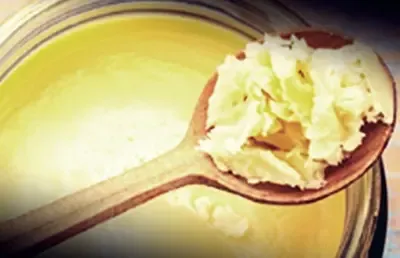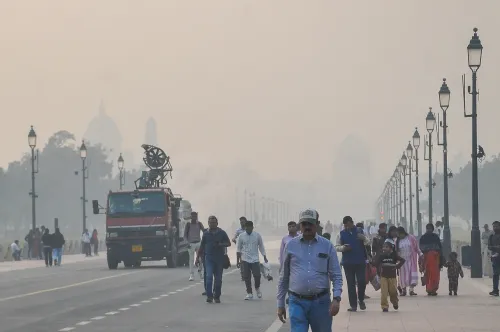Seizure of 4,000 kg Adulterated Ghee Worth Rs 17.5 Lakh in Gujarat

Synopsis
Key Takeaways
- 4,000 kg of adulterated ghee seized.
- Valued at Rs 17.5 lakh.
- Raids conducted by Gujarat Food and Drugs Department.
- Trader has history of food adulteration violations.
- Legal actions pending based on lab results.
Banaskantha, Feb 26 (NationPress) Officials have confiscated 4,000 kg of adulterated ghee valued at Rs 17.5 lakh in Gujarat's Banaskantha district.
The Gujarat Food and Drugs Department executed raids at the locations of Navkar Dairy Products in Deesa and Palanpur, resulting in the collection of 11 samples and the seizure of 4,000 kg of ghee, which was valued at approximately Rs 17.5 lakh. This confiscated stock was aimed for distribution in Rajasthan.
It’s noteworthy that the trader had been previously penalized for adulterating edible oil.
The Food and Drug Regulatory Authority in Banaskantha had earlier issued notices to Navkar Dairy Products for breaching the Food Safety and Standards (Licensing and Registration of Food Businesses) Regulations, 2011.
Despite receiving two chances to amend their violations, the company failed to make necessary corrections, prompting the revocation of its license.
During an unannounced inspection, authorities found that the company continued to produce ghee even after the cancellation of its license.
Upon questioning Sanjaykumar Babulal Mahesuriya, the responsible person, doubts emerged about the ghee being adulterated with soybean oil and interesterified vegetable fat. Consequently, 11 samples from various brands and weights were collected for analysis.
The confiscated stock, which was set for sale during festive seasons in Rajasthan, was seized on-site to protect public health.
The seized samples have been forwarded to a laboratory for examination, and further legal proceedings will ensue based on the findings.
This trader has a record of food adulteration, having been fined Rs 1.25 lakh for adulterating edible oil and Rs 25,000 in a criminal case related to color adulteration in chili powder.
In recent years, Gujarat has ramped up efforts to tackle food adulteration, resulting in significant seizures and legal actions.
From January 2023 to March 2024, the Gujarat Food and Drugs Control Administration (FDCA) executed 15 special drives, focusing on various food items including nutraceuticals, farali foods, ghee, millets, dry fruits, nuts, seeds, bakery items, and spices. These operations resulted in the collection of 18,686 samples and the seizure of around 772.7 tonnes of suspected adulterated goods worth Rs 5.53 crore. A portion of 13.8 tonnes valued at Rs 43.88 lakh was destroyed due to safety concerns.
In a significant 15-day campaign from October 3 to October 17, 2024, called the Food Safety Pakhwada, FDCA officials conducted raids at 115 locations statewide. This initiative led to the seizure or destruction of approximately 233 tonnes of suspected adulterated food items, including 32 tonnes of inedible ghee worth Rs 3.8 crore and 36 tonnes of sweet 'mava'.
The overall estimated value of the confiscated products was around Rs 6.6 crore. All samples were sent to laboratories for scrutiny, with further legal action pending based on the outcomes. During this timeframe, the FDCA imposed fines totaling Rs 1 crore, with Banaskantha district alone contributing Rs 65 lakh in penalties.
Furthermore, in the first four days of the 'Food Safety Fortnight' during Navratri in October 2024, the health department seized 32,000 kg of adulterated food products, which included milk products and edible oil, valued at over Rs 1.73 crore, across 1,170 raids.
Despite these rigorous enforcement measures, challenges remain. Data presented during the winter session of Parliament in December 2024 indicated that 8.3 percent of food samples tested in Gujarat between April and September 2024 did not meet safety standards. Specifically, 360 out of 4,316 food samples analyzed were found to be non-compliant.









